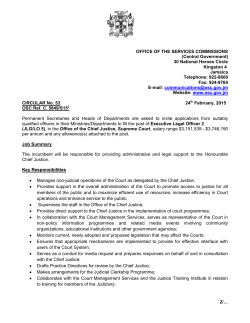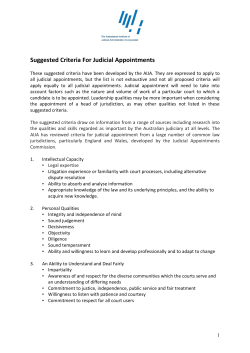
the full document here
Response to RAID “Executive Summary” John G. Ruggie Former UN Special Representative for Business & Human Rights 23 March 2015 Thank you for providing me with the opportunity to respond to the recently released “Executive Summary” issued by RAID, entitled “Principles without justice: The corporate takeover of human rights” (hereafter referred to as “the paper”). If there is a full report of which this 15-page paper indeed is a summary, I have not seen it. The paper draws some sweeping inferences and reaches encompassing conclusions about purported shortcomings of the UN Guiding Principles on Business and Human Rights (UNGPs) based on, in its own words, “two prominent cases of alleged human rights violations concerning two companies.” There is no need for me to respond to the various specific assertions by which the paper arrives at its views regarding the UNGPs. Their growing uptake and the many followon activities by all stakeholder groups speak for themselves. This includes governments, individual companies and business associations, civil society and workers organizations, international agencies, National Human Rights Institutions, and even international and national bar associations. But I do want to correct certain foundational claims because I would not want my silence to be interpreted as implied evidence of their accuracy. First, the document states that “during the drafting process [of the UNGPs], much greater importance was given to the views of companies” than of NGOs. It is not clear how this was measured. It certainly does not reflect the time I spent with the various stakeholders throughout the course of my six year mandate, including during the actual drafting phase. Far more of it was devoted to interacting with governments and NGOs than with business. On the substance of the respective views they expressed, I would say the following. Governments were not simply protecting corporate interests, although that surely was part of the agenda of some. But North and South alike, they had other matters in mind as well, including deep seated doctrinal concerns about making corporations subjects of international human rights law, about setting precedents through the UNGPs for unrelated issues, and in some important cases about raising the perceived political let alone legal status of NGOs—which, regrettably, a number of states have since restricted in their own jurisdictions. My role as Special Representative of the Secretary-General was to make recommendations to governments that (1) would make a difference on the ground, and (2) had a chance of being adopted, for otherwise my six years of work would have gone for naught. Thus, as I subsequently elaborated in my book describing the strategy I pursued, frankly and in detail, I pushed the envelope with governments, but not so far that it would be out of reach.1 Far from discounting the views and roles of NGOs, I believe that their work in the area of business and human rights, as in so many others, is critical. There would be no sustained global business and human rights debate without them. Accordingly, I spent a great deal of time engaging with civil society organizations at international and local levels. A number of leading international NGOs had a clear message for me right from the start: we want binding international standards, involving extraterritorial jurisdiction. I posed two questions in return: is there any evidence to suggest that states, now or in the foreseeable future, are likely to agree to such measures covering the entire universe of internationally recognized human rights, ranging from extrajudicial killings to providing an adequate work/life balance? And if not, how do we prioritize? In keeping with what I called the need for a “smart mix of measures,” I did publicly propose a prioritization for a binding instrument. I said let’s start with gross abuses. “That’s not enough” was the response by some leading NGO voices. But the risks that pushing for an all-encompassing treaty would likely fail politically or, if that hurdle were somehow passed that the instrument would end up being so general as to be of little use to anyone on the ground, have remained unaddressed to this day. And I shudder to think of the damage that could be done to existing human rights standards in the course of an all-encompassing negotiating process. At local levels, civil society organizations generally had little interest in abstract discussions about treaties. They wanted the incidence of corporate human rights abuse diminished, and for victims to get redress when things do go wrong. They didn’t much care doctrinally how that was achieved, which coincided with my own view. My interactions with business were relatively simple. Business was concerned, contrary to the subtitle of the RAID paper, that human rights not be privatized, and that the role of states be made clear and prominent in whatever I ended up proposing. Not surprisingly, they were generally opposed to an international business and human rights treaty. Our discussions focused on the many immediate and practical ways in which respect for human rights can and should be embedded into business practice, irrespective of what states do. The second foundational claim I want to correct is that the UNGPs were to be monitored and implemented “by the companies themselves,” that they are yet another instance of self-regulation. Recall that the UNGPs rest on three pillars: Protect, Respect, 2 and Remedy. These comprise the state duty to protect against human rights abuses by third parties, including business, which is to be achieved through “effective policies, legislation, regulations and adjudication”; the corporate responsibility to respect human rights, which means, in addition to compliance with all applicable laws, to not infringe on the rights of others, requiring human rights due diligence and addressing adverse impacts with which companies are involved; and the need for greater access to effective remedy, judicial and non-judicial. In elaborating the three pillars, the UNGPs provide high-level guidance to states and companies on how to turn the principles into practice, and they constitute benchmarks by which affected individuals and communities can hold both to account. Moreover, they insist at the outset that they “should be understood as a coherent whole,” that business and human rights challenges cannot be successfully met unless all three pillars are in play. Third, it is equally untrue, as the paper asserts, that “redress—one of the central pillars for the GPs framework—is largely to be achieved through company- and operationallevel grievance mechanisms.” In fact, the exact opposite is the case. The very first sentence in the Commentary on Remedy stipulates: “Unless States take appropriate steps to investigate, punish and redress business-related human rights abuses when they do occur, the State duty to protect can be rendered weak or even meaningless.” It may be that the UNGPs are better at describing the problem of inadequate judicial remedy than fixing it. But this does not differentiate them from other plausible efforts at redressing the same problem. Judicial reform is a difficult and long-term project. And even in the most robust legal systems, alternative dispute resolution techniques are widely utilized. Therefore, the Commentary adds that “administrative, legislative and other non-judicial mechanisms play an essential role in complementing and supplementing judicial mechanisms” (emphasis added), and that among them are company- or operational-level grievance mechanisms. The UNGPs specify criteria for such mechanisms, the first of which is “enabling trust from the stakeholder groups for whose use they are intended, and being accountable for their fair conduct of the grievance processes.” The Commentary elaborates that “a business enterprise cannot, with legitimacy, both be the subject of complaints and unilaterally determine their outcome.” Thus, where agreed solutions cannot be reached through dialogue and adjudication is necessary, “this should be provided by a legitimate, independent third-party mechanism.” My final remark concerns what the paper characterizes as the risks of “attributing the authorship of the GPs to individuals and a team rather than the UN per se,” which plays a key role in the overall story it tries to weave together. For precisely the reason of avoiding any such risk, both I and my former team have always used the term UN Guiding Principles. I am aware that others, including some in the UN system, have referred to them as the “Ruggie Principles” or the “Ruggie Rules.” I cannot police such usage. But I would point out that this practice is neither unique nor even unusual. 3 The “Guiding Principles on Internal Displacement,” issued by the UN Office of the Coordinator of Humanitarian Affairs, are universally known as the Deng Principles, after their author. Similarly, the “Principles against impunity,” produced pursuant to a decision of the former UN Sub-Commission on Human Rights, are called the Joinet Principles, referencing their author. By the same rationale, the UN General Assembly report on “Basic Principles and Guidelines on the Right to a Remedy and Reparation for Victims of Gross Violations of International Human Rights Law and Serious Violations of International Humanitarian Law” is widely referred to as containing the Van Boven/Bassiouini principles. And the International Law Commission’s report to the General Assembly on “Fragmentation of International Law: Difficulties Arising from the Diversification and Expansion of International Law” is closely identified with the legal scholar Martti Koskenniemi, who produced the final draft. So there is no conspiracy at play here. If anyone wants to know what a particular provision means or why one turn of phrase was used rather than another, asking the authors does not seem an unreasonable place to start. The business and human rights domain is a difficult one; there is no need to make it even harder. I have never pretended that the UNGPs are the final word on the subject. As I said to the Human Rights Council when I presented the UNGPs for its consideration, in remarks I have repeated often since, its endorsement would not end all business and human rights challenges, but it would mark the end of the beginning by, at long last and after years of discord, providing an authoritative set of baseline standards. The Council agreed unanimously. What matters now is building on what we’ve got and moving forward. Victims need and deserve nothing less. Just Business: Multinational Corporations and Human Rights (New York: W.W. Norton, 2013). The book is available in paperback and has been translated into Chinese, Japanese, Korean, Portuguese and Spanish, so the experience it recounts should now be widely accessible. 1 4
© Copyright 2025

















